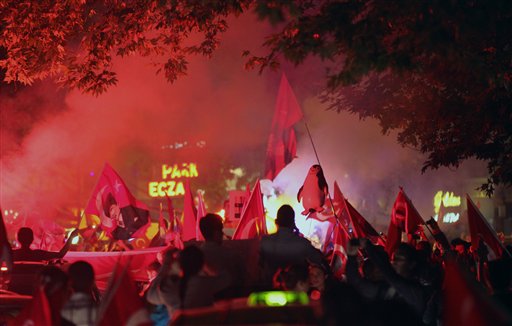While superficially similar, the protests in Istanbul’s Taksim Square are quite different from those in Cairo’s Tahrir Square, which brought down Hosni Mubarak’s regime in 2011. In Turkey, the Islamist party is already in power; in Cairo it had been suppressed for decades. The protests are a backlash of the secular, liberal and urban Turkey that hearkens back to Kemal Atatürk for inspiration, and forward to Europe in its aspirations.
Prime Minister Recep Tayyip Erdogan represents a different Turkish nationalism, one that seeks to combine Islam with liberal democracy. It is a model that President Barack Obama–who is close to Erdogan–has embraced in his own vision for the future of the Islamic world. If Islamists can be integrated into democracy, the thinking goes, they will shed their extreme elements as face the day-to-day tasks of governing.
That has happened, to some extent, in Turkey. Yet Islamist parties are not involved in politics to accept the institutional, post-modern status quo: they have hegemonic cultural ambitions and are ambivalent, at best, about the means through which these are to be imposed. Erdogan is now serving his third term, with no end in sight; he has been in office since before 9/11. And Turkey’s secular liberals sense that a window is closing.
The protesters seem to represent a wide spectrum of European-style opinions, from nationalists to Occupy Wall Street radicals. The Erdogan government has responded with heavy-handed tactics that have escalated the protests, which have become all-out riots. No doubt the chaos will provoke a backlash of its own. But the Erdogan government has been damaged in the eyes of the world; the weakness of the Turkish model is plain.
Like many rebellions, this one began in a time of rising expectations. The Turkish economy has surged in the past several years, surprising many of those who thought that its failure to achieve membership in the EU would harm its prospects. A new generation of Turks has grown up in the Internet age, with aspirations to be part of an integrated world; they do not share Erdogan’s inward, insular, nostalgic vision of the future.
Erdogan has provoked the opposition with his brittle leadership style. It is a style that first appeared–as is so often the case–in his approach to Israel, which had long been a close ally of Turkey until Erdogan began lecturing it on the Palestinian issue and sponsoring flotillas to Hamas-controlled Gaza. Turks may not be pro-Israel, but the friendship with Israel also represented an emphasis on national, not religious, identity.
It is ironic to see Erdogan crushing protests with greater brutality than Israel has ever used against its own citizens. Hundreds of thousands of secular, left-oriented Israelis took to the streets in 2011, and the Israeli government adapted to the challenge by adopting a more reformist policy agenda. The Erdogan government may not survive these protests if its continued harsh approach alienates enough of his political supporters.
Yet it is not clear who or what would replace Erdogan. The fundamental tension in Turkey’s identity will remain–and that is without considering the internal challenge of the Kurdish minority or the external threat of Syria’s collapse. Iran, no doubt, is pleased to see another rival power beset by turmoil. While a reckoning with the Erdogan’s excesses may be long overdue, it could not have come at a more precarious time.

COMMENTS
Please let us know if you're having issues with commenting.